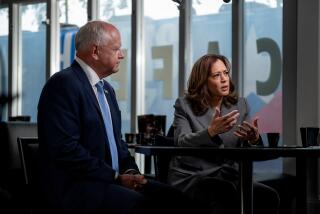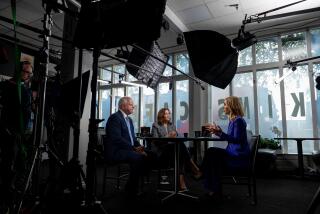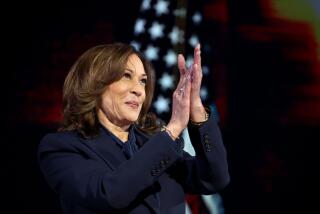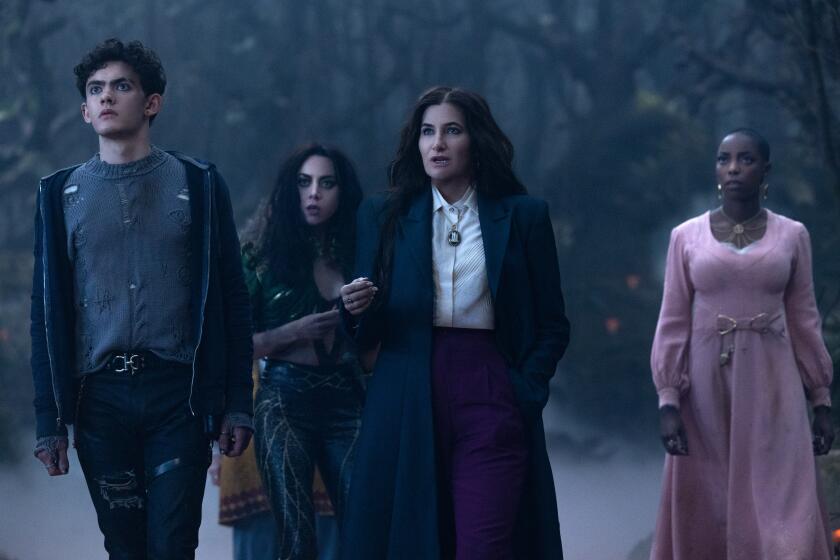Alex Wagner joins ‘the most ambitious television program on the air,’ Showtime’s ‘The Circus’
Alex Wagner grew up immersed in politics in Washington, D.C., where her late father, Carl Wagner, advised such Democrats as Bill Clinton and Ted Kennedy. As she recently recalled over a pot of ginger tea, he’d sit by the phones at night waiting for poll numbers, answering calls with a gruff “Give me the numbers!”
But she followed a circuitous path to political journalism. In her 20s, she focused on music, working as editor of the hipster magazine the Fader, but in 2007 the so-called Saffron Revolution in her mother’s native country, Myanmar, stirred a desire to be “more engaged with the world.”
After stints as executive director of George Clooney’s anti-genocide organization Not On Our Watch and a White House correspondent for Politics Daily, in 2011 Wagner landed her own MSNBC show, “Now With Alex Wagner,” despite being a TV newbie. “We had no idea what the hell we were doing,” she said of the show, canceled in 2015. “But I probably had some success in my career because I haven’t overthought it and I’ve been like, well, we’ll figure it out.”
The 40-year-old is keeping busy with two new projects arriving this month. Beginning Sunday, she’ll join John Heilemann and Mark McKinnon as a co-host on the third season of “The Circus,” replacing Mark Halperin, who was accused of sexually harassing multiple women during a previous job at ABC. Wagner considers “The Circus,” Showtime’s behind-the-scenes political docuseries, “the most ambitious television program on the air.” She’s also got a memoir, “Futureface: A Family Mystery, an Epic Quest, and the Secret to Belonging,” exploring her mixed-race identity and complicated ancestry.
There’s so much news out of Washington these days. What story lines do you think you’ll be following closely this season on “The Circus”?
The Mueller investigation is huge. It could refashion the landscape of American politics in ways that no one can imagine. Or it could be nothing. The midterms could be the most consequential election of my lifetime in terms of the implications of what happens if the Democrats take back the House or Senate. And I’m really interested in the grass roots, what’s happening with Trump’s base, what’s happening with the Democratic base. We know there’s a historic number of women running. And even what we’ve seen in the wake of Parkland, how young people are really engaged and maybe reshaping dialogues we thought were long since established.
You appeared in a few episodes of “The Circus” during the presidential campaign. What appealed to you about joining the show full time?
It’s important to get out into the field and not only talk to voters but see how the campaigns operate. As someone who sat in the anchor chair for a number of years, it’s a whole different experience and a whole different muscle group. The few weeks I was on the road with “The Circus” were really illuminating and I think absolutely made me a better journalist. The Trump presidency is like nothing we’ve ever seen before. It feels really urgent. So it was not a hard sell to ask me to come on to co-host. I’m very worried about the sleep that I’m going to miss and the fact that I have an 8-month-old [son, Cy] at home. Mr. Mom, my husband [former White House chef Sam Kass], will be playing a large role.
You are one of several women in the news media taking over for men accused of misconduct. How does it feel to be part of this bigger change? Do you feel like this show in particular will benefit from your perspective?
I think having a diverse set of voices is always good. I think gender is on the frontburner in a way it hasn’t been ever. It’s great they’re bringing a woman of color into the show. I certainly never watched the show and said they’re missing a critical piece, but I think it’s fantastic they’re broadening their talent. As to the large question of this #MeToo moment, it is unfortunate that the circumstances had to be what they were to bring this moment about, but I’ll take change in whatever package that comes in. It’s unfortunate it has to be a result of what it was, but right on to my fellow sisters.
Your predecessor, Mark Halperin, and other members of the political press were criticized for what some saw as sexist coverage of Hillary Clinton during the campaign. Do you think that’s fair?
I think when you have an industry that is overwhelmingly dominated by one gender and one race, there is necessarily going to be bias whether intentional or unintentional. I don’t think there was malice, necessarily, but politics is a story and one’s interpretation of that story is informed by one’s background. And Hillary Clinton was a first. She was the closest a woman has ever come [to the presidency]. I think there was a lot of expectation. There was a lot of baggage. We probably should have been asking ourselves more pointed questions. Is the coverage fair? Are we paying enough attention to the gender dynamics here? We need to be more inclusive. Not just because it feels good, but the coverage will be better and the fourth estate will benefit overall.
What inspired you to write “Futureface”?
It was borne out of this existential loneliness that I felt as a child. I remember most of my childhood as sitting by myself playing solitaire, listening to Starship on the radio. I think I grew up with this sense that I was alone in the world and I think a lot of my adult life has been a search for community. As a mixed-race kid and only child, the question of identity when you don’t look like anybody else is sort of fraught. This was my attempt to find my people and unpack the story that had been handed down to me. My father was this devout Roman Catholic and about midway through this research I was at a family reunion paddleboarding on a lake with my cousin and he said, “Well, you know we’re Jewish, right?” It was this drop-the-mic moment. Anybody who gets into the story of where you came from will inevitably find snags. This is is me pulling at those snags.
Your mother’s family’s story also turns out to be more complicated than you thought.
The Burmese Rohingya crisis has been an unfolding slowly for a number of years. My mom is a practicing Buddhist, I always thought how could it be possible that a Buddhist country could be doing this to its own citizens. Then I started to do research into my own family and started to better understand Burmese nationalism. We traditionally understand the old world in these glowing romanticized terms. I felt like it was really important to explain that things weren’t halcyon, perfect, rose-tinted, that there were very real problems that were left behind that have very real consequences in the modern era, and that nationalism and tribalism isn’t unique to this particular moment, but it is something that has plagued countries and families around the world. We’re all a little bit broken in some way, and that’s unifying in some way in and of itself.
Do you feel like you learned a lot about yourself or your family in the process of writing the book?
Yes, and I learned more about this country too. My father said growing up in Iowa in a northeast town on the Mississippi River, there were no people of color. I had accepted that unquestioningly; it’s just Iowa. But then you begin to think, why weren’t there people of color? Part of the reason is we drove the people of color who originally owned the land off the land and we prevented other people of color from coming to the country. When his people went over there in the 1850s, the Winnebago had just been kicked off the land. And it’s just not something that ever intersected with my family’s story. These are really simple truths that are readily accessible and yet nobody actually tries to find them or dig deeper into them.
Is there anyone in politics you’re dying to interview for “The Circus”?
Steve Bannon. There are a lot of parts about Steve Bannon that are worthy of investigation, but he has a sixth sense for American politics and it is borne of deep conviction and philosophy. I always want to interview John Boehner. Especially now where he’s just drinking merlot and smoking. He’s a fascinating figure in American politics. He represents the split of the old Republican party with the new. And Melania. Knowing I’ll never get it, but she has an incredible story. Someday, I hope she’ll tell it — to me, or anybody. There’s a lot to unpack there.
See the most-read stories in Entertainment this hour »
‘The Circus: Inside the Wildest Political Show on Earth’
Where: Showtime
When: 8 p.m. Sunday
Rating: TV-14 (may be unsuitable for children under the age of 14)
Follow me @MeredithBlake
More to Read
The complete guide to home viewing
Get Screen Gab for everything about the TV shows and streaming movies everyone’s talking about.
You may occasionally receive promotional content from the Los Angeles Times.






